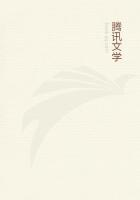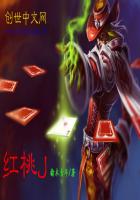On June 13 Tennyson married, at Shiplake, the object of his old, long-tried, and constant affection. The marriage was still "imprudent,"--eight years of then uncontested supremacy in English poetry had not brought a golden harvest. Mr Moxon appears to have supplied 300 pounds "in advance of royalties." The sum, so contemptible in the eyes of first-rate modern novelists, was a competence to Tennyson, added to his little pension and the epaves of his patrimony. "The peace of God came into my life when I married her," he said in later days. The poet made a charming copy of verses to his friend, the Rev. Mr Rawnsley, who tied the knot, as he and his bride drove to the beautiful village of Pangbourne. Thence they went to the stately Clevedon Court, the seat of Sir Abraham Elton, hard by the church where Arthur Hallam sleeps. The place is very ancient and beautiful, and was a favourite haunt of Thackeray. They passed on to Lynton, and to Glastonbury, where a collateral ancestor of Mrs Tennyson's is buried beside King Arthur's grave, in that green valley of Avilion, among the apple-blossoms. They settled for a while at Tent Lodge on Coniston Water, in a land of hospitable Marshalls.
After their return to London, on the night of November 18, Tennyson dreamed that Prince Albert came and kissed him, and that he himself said, "Very kind, but very German," which was very like him. Next day he received from Windsor the offer of the Laureateship. He doubted, and hesitated, but accepted. Since Wordsworth's death there had, as usual, been a good deal of banter about the probable new Laureate: examples of competitive odes exist in Bon Gaultier. That by Tennyson is Anacreontic, but he was not really set on kissing the Maids of Honour, as he is made to sing. Rogers had declined, on the plea of extreme old age; but it was worthy of the great and good Queen not to overlook the Nestor of English poets. For the rest, the Queen looked for "a name bearing such distinction in the literary world as to do credit to the appointment." In the previous century the great poets had rarely been Laureates. But since Sir Walter Scott declined the bays in favour of Southey, for whom, again, the tale of bricks in the way of Odes was lightened, and when Wordsworth succeeded Southey, the office became honourable. Tennyson gave it an increase of renown, while, though in itself of merely nominal value, it served his poems, to speak profanely, as an advertisement. New editions of his books were at once in demand; while few readers had ever heard of Mr Browning, already his friend, and already author of Men and Women.
The Laureateship brought the poet acquainted with the Queen, who was to be his debtor in later days for encouragement and consolation. To his Laureateship we owe, among other good things, the stately and moving Ode on the Death of the Duke of Wellington, a splendid heroic piece, unappreciated at the moment. But Tennyson was, of course, no Birthday poet. Since the exile of the House of Stuart our kings in England have not maintained the old familiarity with many classes of their subjects. Literature has not been fashionable at Court, and Tennyson could in no age have been a courtier. We hear the complaint, every now and then, that official honours are not conferred (except the Laureateship) on men of letters. But most of them probably think it rather distinguished not to be decorated, or to carry titles borne by many deserving persons unvisited by the Muses. Even the appointment to the bays usually provokes a great deal of jealous and spiteful feeling, which would only be multiplied if official honours were distributed among men of the pen. Perhaps Tennyson's laurels were not for nothing in the chorus of dispraise which greeted the Ode on the Duke of Wellington, and Maud.
The year 1851 was chiefly notable for a tour to Italy, made immortal in the beautiful poem of The Daisy, in a measure of the poet's own invention. The next year, following on the Coup d'etat and the rise of the new French empire, produced patriotic appeals to Britons to "guard their own," which to a great extent former alien owners had been unsuccessful in guarding from Britons. The Tennysons had lost their first child at his birth: perhaps he is remembered in The Grandmother, "the babe had fought for his life." In August 1852 the present Lord Tennyson was born, and Mr Maurice was asked to be godfather. The Wellington Ode was of November, and was met by "the almost universal depreciation of the press,"--why, except because, as I have just suggested, Tennyson was Laureate, it is impossible to imagine. The verses were worthy of the occasion: more they could not be.
In the autumn of 1853 the poet visited Ardtornish on the Sound of Mull, a beautiful place endeared to him who now writes by the earliest associations. It chanced to him to pass his holidays there just when Tennyson and Mr Palgrave had left--"Mr Tinsmith and Mr Pancake," as Robert the boatman, a very black Celt, called them.
Being then nine years of age, I heard of a poet's visit, and asked, "A real poet, like Sir Walter Scott?" with whom I then supposed that "the Muse had gone away." "Oh, not like Sir Walter Scott, of course," my mother told me, with loyalty unashamed. One can think of the poet as Mrs Sellar, his hostess, describes him, beneath the limes of the avenue at Acharn, planted, Mrs Sellar says, by a cousin of Flora Macdonald. I have been told that the lady who planted the lilies, if not the limes, was the famed Jacobite, Miss Jennie Cameron, mentioned in Tom Jones. An English engraving of 1746 shows the Prince between these two beauties, Flora and Jennie.














